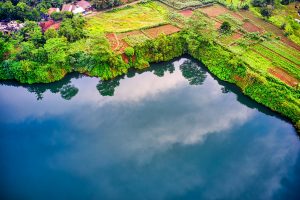Marijuana is perhaps the most highly-regulated crop in the state. Earlier this year, the state added another complication in the form of regulations imposed by the State Water Resources Control Board, which sets rules (a veritable maze of them) for the cannabis cultivation industry. 
Recently, the California Water Boards sent out some 270 letters to marijuana farmers operating in the Emerald Triangle, warning them to comply with state regulations or else face potential fines – or even loss of their licenses to grow the crop.
The compliance letters were sent to cultivation operations in Mendocino, Humboldt and Trinity counties, informing them of their lack of appropriate permitting for all their cannabis business operations.
The warnings were sent to landowners whose properties appear to be using their space for purposes of growing the crop, yet have no enrollment in the state waterboard’s cultivation program. As Los Angeles cannabis farmer attorneys can explain, proper permission from the local water board is required to legally grow marijuana in California.
Last year, some 2,300 marijuana cultivation licenses were issued among those three counties.
Cannabis Farming and Water Board Regulations
The rules imposed by the state water resources board is in place because cultivating cannabis has the potential to impact watercourses such as lakes, rivers, creaks or streams. The majority of the regulations are applicable to so-called “sun-grown cannabis,” which is legal in some form or another in a dozen counties. Licenses are issued through the state’s Cultivation Licensing Program.
Among the regulations required by state water boards:
- Development of farmlands for cannabis cultivation, erosion should be controlled and hillsides avoided. There are very specific rules for growing marijuana on land that is undisturbed. Additionally, there are a host of limits imposed when development on any sensitive areas or earth-moving activities. No one can grow marijuana on hills with a slope of 50 percent or more. The rules also prohibit heavy equipment and vehicles in riparian zones.
- Farmers of marijuana should avoid growing the crop in or near any surface water body, such as lakes, streams or rivers. Any grading of land requires consultation with an experienced biologist who can identify any sensitive fauna or flora.
- In dry season, cannabis farmers are not allowed to use surface water. Any use of surface water supplies in the state of California must have a proper permit or license from the state water board. No surface water can be diverted during the dry season. During grow/wet season (April through October) there are tight restrictions.
- Regulation of groundwater, less stringent than surface water, still requires avoiding using wells or drilling near bodies of water. Cannabis growers also cannot rely on onstream storage reservoirs, except without permit.
Los Angeles marijuana cultivation attorneys know that state water board licensing and regulation is incredibly complex. Investors, landowners and entrepreneurs should work closely with an experienced attorney to ensure they are in compliance, to avoid costly fines and other penalties that might jeopardize their profits or ability to operate.
The Los Angeles CANNABIS LAW Group represents growers, dispensaries, ancillary companies, patients, doctors and those facing marijuana charges. Call us at 949-375-4734.
Additional Resources:
DIRECTIVE NOTICE TO OBTAIN REGULATORY COVERAGE FOR CANNABIS
CULTIVATION OR ASSOCIATED ACTIVITIES, Sept. 20, 2019, State Water Resources Control Board
